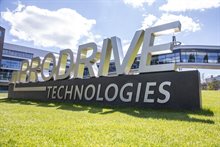On track for growth
In the FNS partner interviews, we feature a partner every week. Our partners give insight into the developments and innovations within their company and their role in 6G Future Network Services.
This time we spoke to Bart van Ark, working as a system architect. Bart explains, "Prodrive focuses on a lot of different markets, from medical to automotive, but we are also, for example, developing converters for hydrogen generation. Through innovative designs, energy efficiency and responsible manufacturing processes, we strive to create products that make the world work."
Founded in 1993, Prodrive Technologies ('Prodrive') develops and manufactures a wide range of products for the mobility, semiconductor, energy, medical and industrial markets. Prodrive emerged from a collaboration between the two founders at TU/e and is still growing at 20-30% per year. Prodrive's business model is based on a combination of in-house R&D and high-tech production facilities, with a total workforce of around 2,500 FTE. Prodrive is headquartered in Son (Eindhoven region) and also has production facilities in the USA (Boston) and China (Suzhou). The company has subsidiaries in the Netherlands, USA, China, Israel, Germany and Japan. The reported turnover for 2023 was more than €500 million.

Good match with 6G
Prodrive has had a warm relationship with TU/e since its inception, which approached them for FNS. For about a decade, they have also been working on radio frequency applications, developing applications for various markets. As part of the FNS program, they are researching amplifier topologies to improve efficiency and robustness. "We see that this is a growing market. We make a lot of power electronics, which is creeping closer and closer to radio frequency technology. We do both and are therefore very strong in this. So we don't just look at the end application, but investigate different topologies. The first results show that our technology can be very suitable for 6G."
Challenges
Bart sees some challenges in relation to the new developments. "Two things I foresee are issues around thermal housekeeping and what I would call 'legacy'; the whole market has to change across the board, which is not easy. We want more bandwidth and that means increasing powers while antenna density is going down. Everything is getting closer together, and that makes it difficult to get the heat out. Cooling then becomes more difficult, so we need better efficiency, also for the environment. That's what we are going to work on, because at Prodrive, we are committed to improving people's quality of life, reducing the impact on our environment and contributing to a more sustainable world."
Role and cooperation within FNS
Prodrive – active in program line 1 - develops amplifier topologies for higher efficiency, in this they are unique within the consortium. They believe that creating a more sustainable world is a collective effort and actively seek partnerships and collaborations to bring about change. Within FNS, they are in talks with several partners. "Recently, we met with Ampleon and TNO. We found out that we independently have the same research question. We are now looking at how we can organise this well together. Participation in FNS provides an extra boost here to give it more priority, also internally."
Future
Prodrive is now growing towards becoming a multinational and targeting growth markets, so Bart sees the future as bright. Bart adds: "We work with a lot of young people; the average age with us is 28. We have many starters from university, but also many part-timers who start working for us. Prodrive is a great company to gain suitable experience."
